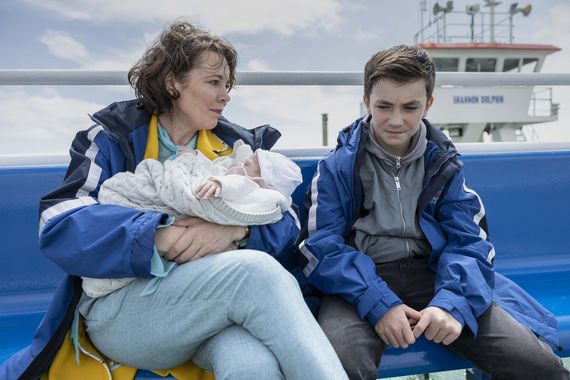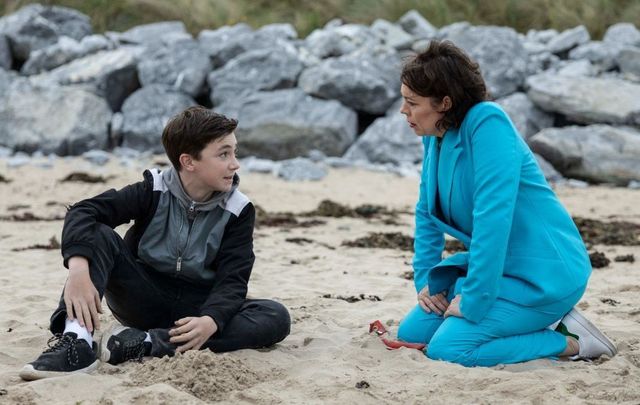You have seen Olivia Colman play the Queen of England but now she takes on an even greater challenge, playing a reluctant Kerry mammy (yes, with the Irish accent and all).
In the new Irish film 'Joyride', she's one of two troubled souls who meet by accident and eventually end up saving each other.
In 'Joyride' talented Irish newcomer Charlie Reed, 15, plays recently bereaved son Mully and Olivia Colman plays Joy, a train wreck new mother whose paths cross by accident one fateful night.
Joy (she readily admits that her first name is a huge misnomer) is an unmarried solicitor who has just given birth to an infant daughter she's named Robin - but we soon find out that motherhood is not her plan.
Earlier in the evening, thirteen-year-old Mully attends a fundraiser held in his late mother's memory, but his hoodlum father James (Lochlann O'Mearáin, best known for "Outlander") has selfish plans for all the cash that's been raised.
Taking off with the money before his dad has the chance to swipe it, Mully steals an idling taxi and hits the road. It's only when he's out in the open country lanes that he notices the baby in a sleeping cot in the back seat.
Then he notices the fast-asleep Joy. His first instinct is to throw them both out but Joy wakes up and is adamant about where she wants to go and in what order.
The chemistry between Colman and Reid is immediate. They are caustic and inventive in their nonstop insults, suggesting they're evenly matched in the temperament stakes.
If the premise seems a bit outlandish Reid and Colman still sell it for all they're worth, making you realize that the central issue is that they're two lost and damaged souls who want to do the right thing, although neither is quite sure what the right thing actually is.
As the story unspools and they drive around County Kerry, usually at cross purposes, we learn about them. Mully misses his mother and has ambivalent feelings at best about his deadbeat dad.

Olivia Colman and Charlie Reid in Joyride
He knows that the road is running out for him at home but he has no real options, so he's biding his time and has the curiosity to hear what he calls this “mentalist” woman named Joy is really up to.
Joy is a darker horse. She's clearly not cut out to be a mother, or so she seems to believe, and soon we learn that her own mother has set her the worst possible example. Joy is secretly terrified that she'll be as toxic a parent as the woman who raised her, to the point where she doubts her own capacities and is stricken with fear.
Watching over these two wounded birds is a little robin, a native of Ireland, that Mully feels could be a message sent by his mother to say that she's still guiding his path. It's a sweet moment in a film that roots hard for its two protagonists alongside the viewers.
Don't get the impression that Ailbhe Keogan's script sugarcoats the themes it addresses, though. Abandonment, betrayal, lovelessness, grief, and heartache are all baked into the story, meaning that this film finds a way to deal with some of the worst things that life can throw at you without making you want to take a breather or turn it off.
Colman's Irish accent is fantastic throughout the film. She goes beyond the surface inflections to capture the certain way of being alive in the world that Irish women have. In other hands, it could be a Far and Awaystyle debacle, but in hers, she has the patience and skill to decode us and offer us back to ourselves in a performance that is both respectful and convincing.
As they drive around arguing about where they should go next both Joy and Mully accidentally draw each other out, painting a picture of two people at literal crossroads in their lives. Joy is especially damaged and brittle, and for most of the film she says – and we may even agree – that she's not what her newborn needs in terms of stability or affection.

Olivia Colman and Charlie Reid as two lost souls who save each other in Joyride
Mully meanwhile is a bit of a street fighter with a surprisingly tender heart. At first, he comes off as tough as nails but Joy sees the frightened boy lurking beneath the tough guy exterior and her long-dormant maternal instinct starts coming slowly to life at the sight of it. In wanting to protect him from his no-good dad her long-dormant affection for her own child starts to kindle.
Sometimes all we need is a fresh perspective Joyride reminds us. The solution that we thought we'd never find might always have been within our own grasp to begin with. Yes, it sounds like an afternoon talk show pep talk, but those lessons resonate for a reason.
Once you get out of your own way, Joyride reminds us, a new perspective can emerge that lets you see what you've missed and help live the way you had always hoped to. “I'm only going one way and that's forward,” Joy says repeatedly as the film progresses.
As the unprincipled villain, Lochlann O'Mearáin is a bad dad pretending to be a good one. He manipulates Mully, plays on his hopes and dreams, and appeals to his devotion to his late mother to get the only thing he wants: the wad of cash Mully is carrying to pay off his many gambling debts.
It's rare to see an Irish dad this deadbeat in a contemporary film and O'Mearáin is convincing as a conscienceless man looking out for number one, even stealing from a 13-year-old to do it.
If Mully follows the path that his father will take him down it'll more likely lead to prison than a possibility, Joy realizes pretty quickly. That realization – and her growing affection for the decent kid in a hard situation – leads her toward a life-transforming change that she fights almost to the end of the film.
'Joyride' is an affecting new Irish film about the fate of love. Love lost and love found and what connects us if we are only willing to let it. It's also about how the fear of making ourselves vulnerable to pain can slowly unmoor our lives and make us hard and unreachable, the very things we don't want.
Renewing that lesson will never get old, but films that do it as successfully as this one are few and far between.
'Joyride' will release in theaters and on demand on December 23, 2022.




Comments